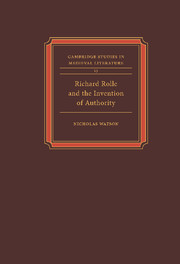Book contents
- Frontmatter
- Contents
- Preface
- List of abbreviations
- Introduction: Contexts: three preliminary essays
- PART I
- PART II
- PART III
- 5 Contemplative life, Fervor: Incendium Amoris
- 6 Contemplative life, Dulcor: Super Psalmum Vicesimum, Super Canticum Canticorum, Contra Amatores Mundi
- 7 Contemplative life, Canor: Melos Amoris
- PART IV
- Epilogue: Rolle as a late medieval Auctor
- Excursus I: The chronology of Rolle's writings
- Excursus II: Rolle's reading and the reliability of the Officium
- Notes
- Bibliography
- Index
6 - Contemplative life, Dulcor: Super Psalmum Vicesimum, Super Canticum Canticorum, Contra Amatores Mundi
Published online by Cambridge University Press: 04 December 2009
- Frontmatter
- Contents
- Preface
- List of abbreviations
- Introduction: Contexts: three preliminary essays
- PART I
- PART II
- PART III
- 5 Contemplative life, Fervor: Incendium Amoris
- 6 Contemplative life, Dulcor: Super Psalmum Vicesimum, Super Canticum Canticorum, Contra Amatores Mundi
- 7 Contemplative life, Canor: Melos Amoris
- PART IV
- Epilogue: Rolle as a late medieval Auctor
- Excursus I: The chronology of Rolle's writings
- Excursus II: Rolle's reading and the reliability of the Officium
- Notes
- Bibliography
- Index
Summary
The last section of Incendium Amoris presents us with an apparently fully confident Rolle, who has resolved the problems surrounding his subjectmatter and his presentation of himself, and who would therefore seem to be in the proper position to begin exercising his newly asserted spiritual authority. An obvious way of doing this would be to return to writing works with some of the didactic clarity of judica Me, works which would attempt to propagate his mystical experiences in a systematic manner, with an attention to the needs of readers such as Incendium Amoris itself too frequently fails to display. However, if my reconstruction of Rolle's career is correct, what actually happens is just the opposite: in the works to be discussed in this and the next chapter, the issue of spiritual authority, rather than being taken for granted, assumes ever greater prominence – while, at the same time, Rolle's writing manages to become even less responsive to his readers' need for practical edification. These apparently puzzling developments reflect the fact that there are actually numerous questions which Incendium Amoris has not remotely resolved: How can canor guarantee the spiritual security of the perfecti? How do Rolle's mystical experiences relate to the importantly different ones described by his own auctoritates Why should readers take his eloquence as proof that his experiences are genuine? In order to address these and other difficulties, the progressive revelation from fervor to dulcor to canor around which Incendium Amoris is structured (see pp. 121–122) must continue.
- Type
- Chapter
- Information
- Richard Rolle and the Invention of Authority , pp. 142 - 170Publisher: Cambridge University PressPrint publication year: 1991



